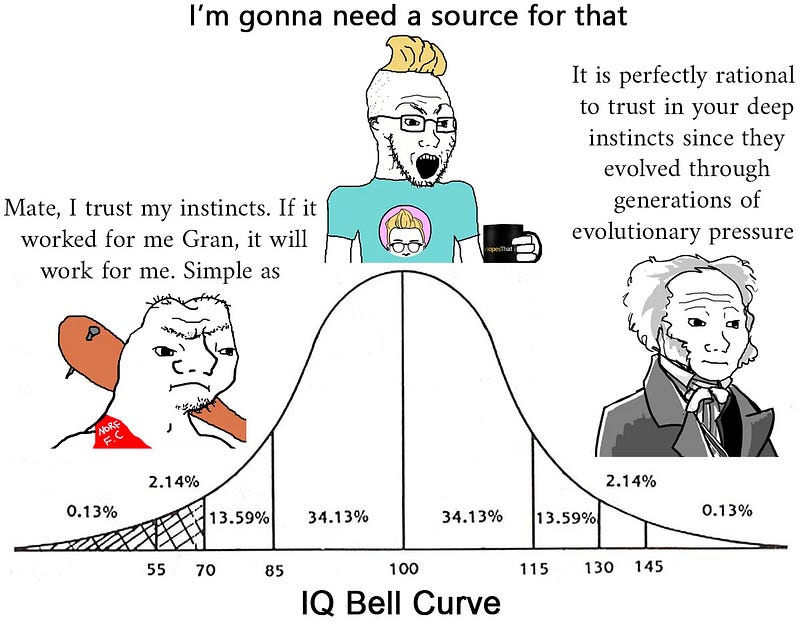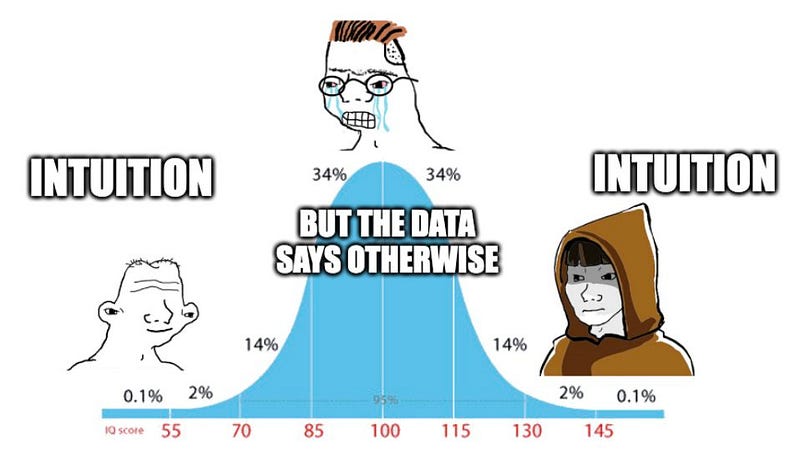A Journey Through the Midwit Trap: Embracing Intuition and Reality
Written on
Chapter 1: Understanding the Midwit Phenomenon
The concept of the "midwit" feedback loop is quite intriguing. It highlights how common sense and intuition can be overshadowed by overly "objective" explanations that often serve to justify our personal flaws. Despite the emotional toll, we tend to embrace these narratives for a fleeting sense of status. When those outside our circle challenge our unconventional ideas, it reinforces our belief that the majority simply cannot grasp our perspectives, leading to a cycle of distrust in both our instincts and the wider world.
This peculiar feedback loop is something I know all too well. It's essentially the essence of the "midwit" trap, which has inspired a series of amusing memes:

A prime example of this mindset can be observed in Malcolm Gladwell's work. He often opens with statements like, "Do you think people smile when they’re happy? No, actually your intuition is… incorrect." This approach gives us a rush of dopamine for feeling that we possess knowledge that others lack (and I’m not immune to this phenomenon). Gladwell has become adept at presenting information that is both counterintuitive and captivating.
These cognitive rabbit holes are abundant, from followers of Andrew Tate to individuals who recount John Oliver segments verbatim while enjoying a drink. Many others exist: Red pill, pop science, social engineering, pickup artistry, hustle culture, manifestation, outrage news, astrology, Bitcoin… Most of us have, at some point, dipped our toes into these waters.
For me, this journey began long before TikTok when a particularly fiery, chain-smoking philosophy professor introduced me to one of the most brilliant midwits, Friedrich Nietzsche.
On the first day of class, he declared, “There’s always some emo kid in the back who believes Nietzsche would’ve been on his side. He would not have been on your side, dude.” That perspective was part of Nietzsche's allure.
Nietzsche famously claimed he could express more in a single sentence than most philosophers could in an entire book. He had a flair for dramatic capitalization to emphasize his points: “I Am Not a Man, I Am Dynamite!” The power of that statement lies in its truth. If reading Nietzsche doesn’t leave you feeling somewhat bewildered, you’re likely missing the essence of his philosophy.
Nietzsche’s assertion of the "death of God" spoke to the loss of a unifying motivational force for a diverse population in Europe. He lamented, “God is dead…. and we have killed him…. What was the holiest and mightiest of all that the world has yet owned has bled to death under our knives: who will wipe this blood off us?”
He predicted that this demise would result in depression, war, and the emergence of nihilism—prophecies that tragically aligned with the events of the 20th century.
This concept resonated with my own personal "death of God" as I transitioned away from my Christian roots into the secular realm of philosophy, seeking answers that would elevate my status over others. Nietzsche’s solution to the death of God was the call to become "supermen"—to create our own moral compass.
“Is not the greatness of this deed too great for us? Must we ourselves not become gods simply to appear worthy of it?” This idea was particularly appealing to a young man eager for recognition and status.
However, the notion of creating one’s own morals is as feasible as playing a violin in the vacuum of space. We all worship something, whether we acknowledge it or not; that is our religion, regardless of its form. As Bob Dylan famously put it, “You gotta serve somebody.” If we’re not intentional about our values, we likely end up serving desires for power, wealth, fame, or pleasure, often embodied by various midwit influencers.
During my college years, I became increasingly alienated from my friends, family, and community as I pursued philosophical "correctness" with a zeal akin to a religious fervor. I was on that sigma grindset, and the outcome was far from fulfilling. The more I attempted to dictate my own ethics through sheer will, the deeper the disconnect grew between my mind and body.
Ironically, Nietzsche faced severe health challenges, only able to write for about 30 minutes a day. The last decade of his life was marked by profound insanity—a struggle against reality that he ultimately lost. Considering Nietzsche’s intellect, with an IQ nearly double mine, I found myself questioning my chances of becoming the "Ubermensch."
In discarding the God of my upbringing, I hadn’t embraced a non-religious existence; instead, I had subconsciously replaced a mysterious deity with a vague assembly of the world’s intellectual elite—my own council of Nietzsches. I picked the most "objective" authority I could conceive and, without awareness, sought to "please" these newfound gods through my actions. As a follower of rationality, I dismissed astrology and other "woo-woo" beliefs, opting instead to align myself with esteemed scholars and their sophisticated works.
This phenomenon, while extreme, is not uncommon; many individuals fall into internet rabbit holes, convinced that their insider knowledge is the ultimate truth, while dismissing others as mere "NPCs." On the extreme end, this mindset strips away our humanity. It’s easy to rationalize away joyful and positive emotions, but there’s no escaping pain and disgust—they simply happen to us.
As we delve deeper into these cognitive labyrinths, we often find ourselves left with only negative emotions. If our worldview leads us to perceive humanity as a "cancer on the planet," perhaps the issue lies not with humanity itself, but rather with the narrative we choose to believe.
The deeper challenge is that "rational" individuals, by the very nature of their beliefs, cannot recognize reality as narrative. Yet, it is, indeed, a narrative. My own “rational materialism” perspective was invisible to me, and I was as fervent in my beliefs as any religious zealot.
In hindsight, I should be kinder to myself. At the core of these loops lies fear—the fear of being wrong, the fear of being ordinary, and the fear of being lost in the crowd. The modern individual’s deepest tenet is a fear of reality.
For a belief system that touts scientific accuracy, it ironically cultivates a mindset of close-mindedness. While trapped in this invisible narrative, we sense a disconnection, attributing it to a malfunction in human nature (i.e., reality). We convince ourselves that the issue must be a chemical imbalance, ADHD, social media, the modern world, capitalism, socialism, or any other scapegoat.
The true problem is a flawed narrative that breeds hostility towards the world, intensifying the more we invest in it. The sense of “rightness” we cling to provides a semblance of status, which we defend fiercely, even as we sink further into despair.
This cycle is destructive. We cannot return to the mindless masses, a fear that adherents to these various pseudo-faiths dread more than death itself. The only path forward is through embracing reality, with all its peculiarities.
If the naive acceptance of the religion we were born into represents step one, followed by trauma and cynicism as step two, then developing a humble, wise, and authentic connection to a higher power can be considered step three. At least, that’s one perspective on striving to face reality a bit more each day.
I’m still working on it.
These half-religious ideologies permeate our existence, rendering us awkward, disconnected, chronically online, unable to engage in simple joys, self-absorbed, and inundated with peculiar ideas that alienate us from others. Recovery from this state requires time.
The phenomenon of 4chan “incels” is just one (arguably) extreme example of a broader issue we all confront. Midwit traps are omnipresent, embedded in our devices and media. They transcend political affiliations; their sole aim is to capture our attention and devotion. They are lesser deities.
We still inhabit a world rich in gods and demons; they’ve simply mastered the art of making us forget their existence. I’ve come to realize that any narrative suggesting we can escape all narratives to “see the truth” is a misleading illusion. We are not disembodied minds; we are a synthesis of mind, body, and spirit.
While this discussion of myth and embodiment may seem peculiar, this essay isn’t intended to be another midwit trap. Its purpose is to redirect our overly analytical minds back to their roots, encouraging us to let go, trust in deeper understanding, recognize narrative, cultivate faith, and rely less on the material world's assertion that we are merely bags of chemicals.
In essence, this meme illustrates the core message:

Chapter 2: The Midwit Trap in Modern Discourse
The first video titled "Are you building #solidity #smartcontracts? Avoid the midwit trap: keep it simple" explores how simplicity can be overlooked in complex discussions, emphasizing clarity over convoluted reasoning.
The second video, "Tyranny of the Midwits," delves into the societal implications of midwit thinking and the consequences of losing touch with deeper truths.
Thank you for reading,
Taylor